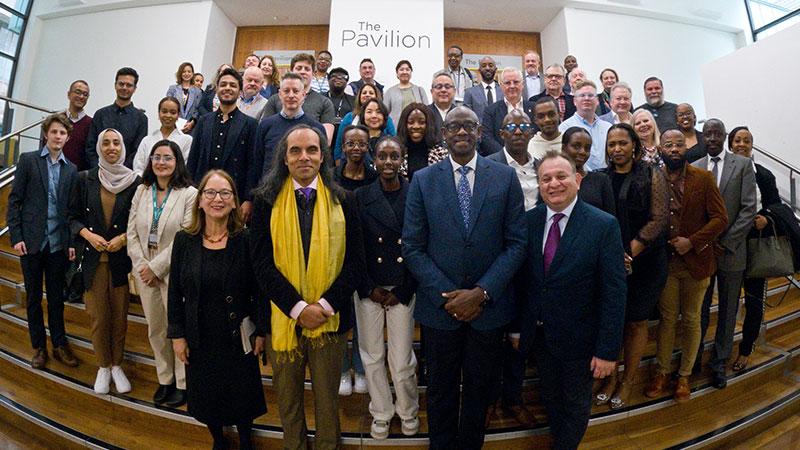The College of Liberal Arts and Sciences hosted esteemed guests from the Rwanda High Commission and from the University of Rwanda, Kigali, on 2 May to foster collaboration and rebuild a nation.

Colleagues and students from across the University, as well as visitors from across the UK, had the opportunity to hear from Rwanda’s High Commissioner, His Excellency Johnston Busingye, and the Director of the Centre for Human Genetics at the University of Rwanda, Professor Leon Mutesa.
The High Commissioner, His Excellency Johnston Busingye, addressed the audience, describing the history of the country, explaining how colonialisation, racist scientific practices and a myriad of other historical events led, over a long period, to the 1994 Rwandan genocide against the Tutsi. He referred to the lasting impact of this as well as the resilience that it took for the country to pick itself up, its reconstruction and rebuilding and the focus on regional and international links, technological advancement and development of the health infrastructure.

Professor Leon Mutesa, Director of the Centre for Human Genetics at the University of Rwanda, gave an address on his most notable scientific achievements. Describing the strategy developed during the COVID-19 pandemic, including the need for affordable SARS-CoV-2 testing, he spoke about the pooled-testing approach. The development of the biomedical science infrastructure and role of Rwanda as a regional hub was described alongside the plans for vaccine development.
Professor Mutesa next shared his pioneering work on the biological effects of trauma including PTSD resulting from the genocide against the Tutsis. The transmission of epi-genetic changes from mother-to-daughter/son-to-granddaughter/grandson was also described. Mutesa’s team has been recognised for this important work by being awarded the Africa Prize from the Human Genome Organisation this April.

Jill White, a first-time visitor to the University of Westminster, commented: “It was powerful to hear such uplifting messages and to see the progress and the hope […] We need to learn more, appreciate more, and continue to work together.”
Professor Dibyesh Anand, Deputy Vice-Chancellor for Global Engagement and Employability at Westminster, opened the event and spoke about the resolve of the University of being a global institution and sharing its values with others.
In their closing speeches Dr Tom Moore, Interim Head of College of Liberal Arts and Sciences, and Professor Miriam Dwek, Director of Research and Knowledge Exchange, College of Liberal Arts and Sciences, thanked the Rwandan visitors and reiterated the University of Westminster’s commitment to fostering meaningful international collaborations.
The University of Westminster is working on multiple projects in Rwanda. The Quintin Hogg Trust have supported this work since 2017 and is currently supporting two projects led by Darrell Kofkin, Senior Lecturer in Social Entrepreneurship. One is sponsored by the School of Architecture and Cities and is called the Rwanda Land Development Project (2023/24). The other one is Developing a Sustainable Tourism Strategy for a Rwandan Coffee Plantation (2024/25), sponsored by the Centre for Education and Teaching Innovation (CETI).
This event directly contributes to the United Nations Sustainable Development Goals (SDG) 16: Peace, Justice and Strong Institutions and 4: Quality Education. Since 2019, the University of Westminster has used the SDGs holistically to frame strategic decisions to help students and colleagues fulfil their potential and contribute to a more sustainable, equitable and healthier society.
Find out more about Politics and International Relations and Biomedical Sciences courses at the University of Westminster.
Photo Credit: Dominik Cholewa/fotografisko







